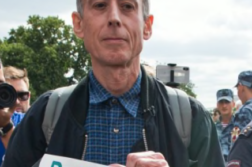“YOU’RE AN AMERICAN!” the young fellow sings out, his broad, freckled face three inches from my own, his brogue competing with the lesbian jazz band whose music fills this Temple Bar pub called The George. When I’ve heard these words in Turkey and certain other countries during the Bush administration, I have not had the pleasure of looking into a smiling face. But here, good will leaps at me often. I ask him how he can tell. He slaps my bare chest. “We Irish are too modest to dance without our shirts,” he explains, then lifts me off the dance floor, spins me around, and kisses me. “Are ya from California, friend? Take me home, and let’s you ’n’ me git married!”
I happen to be a Californian, but I haven’t checked my email in twenty-some hours, and this is the first I’ve heard about the state Supreme Court’s ruling on same-sex marriage. I attempt to swing him around, but he’s a good six inches taller than I, and the effort is aborted. He laughs, his own shirt flies off, and the Irish girl-band Zrazy plays until 3:00 a.m.





